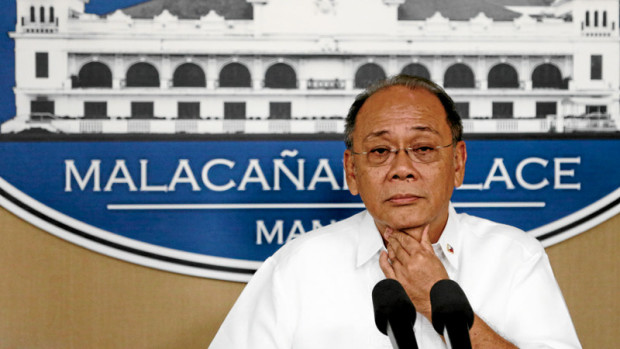How President’s men interpret controversial statements
The President’s men have taken turns either to contextualize, justify or spin Mr. Duterte’s scathing remarks that have offended various groups, world leaders and allies.
For one, presidential spokesperson Ernesto Abella has advised the media to “not be too literal” and to “use creative imagination” as he sought to minimize the fallout of President Duterte’s sweeping tirades against the United States, the United Nations and the European Union which had questioned his bloody war on drugs.
During a state visit to China last week, Mr. Duterte triggered confusion when he declared a “separation” from traditional defense ally the United States. His cabinet officials tried to contain the damage and offered various explanations, but the president himself saved them the trouble by pulling back upon arriving home Friday.
“You know, you have to take my words in the context of what I have been saying all along. It’s not severance of ties. When you say severance of ties you cut the diplomatic relations. I cannot do that. Why? It’s to the best interest of my country that we maintain that relationship,” President Duterte said.
He stressed there were many Filipinos living in the US who had already assimilated. “What I was really saying was separation of a foreign policy.”
Article continues after this advertisementGenocide
Article continues after this advertisementHe has also been forced to apologize for drawing parallels between his drugs war and Hitler’s genocide, drawing condemnation from the global Jewish community. He had said he would be happy to slaughter 3 million addicts noting that Nazi dictator Adolf Hitler had murdered millions of Jews.
“If Germany had Hitler, the Philippines would have…,” Duterte said, pausing and pointing to himself.
He also said he had lost “faith in the Americans” and remarked: “You can go to hell, state department. You can go to hell, Obama. You can go to hell, EU. You can choose purgatory because hell is full. Why will I be afraid of you?”
Abella said the President’s reference to the slaughter of Jews was an “oblique deflection of the way he has been pictured as a mass murderer, a Hitler, a label he rejects.”
“He likewise draws an oblique conclusion, that while the Holocaust was an attempt to exterminate the future generations of Jews, the so-called extrajudicial killings, wrongly attributed to him, will nevertheless result in the salvation of the next generation of Filipinos,” Abella said.
US-PH military exercises
On Sept. 28, Duterte told the Filipino community in Vietnam that a joint US-Philippine military exercise scheduled in the first week of October would be the last, and ruled out joint Navy patrols in the heavily disputed South China Sea.
“You (Americans) are scheduled to hold war games, which China does not want. I will serve notice to you now that this will be the last military exercise,” he said.
Foreign Secretary Perfecto Yasay, who was part of Duterte’s entourage, said in a press briefing that Duterte’s remarks did not mean the cancellation of any agreement or treaty with the United States.
Yasay said the Visiting Forces Agreement, under which the joint military exercises are held, would continue even beyond Mr. Duterte’s six-year term, and that the cessation of any agreement would have to be decided mutually by the two countries.
“He cannot abrogate the treaty. He said he would respect it,” Yasay said,
Salary hike
In his visits to military camps, Mr. Duterte had told soldiers and policemen that they would be getting a pay increase beginning August, only to be told later on by Budget Secretary Benjamin Diokno that there was no allocation for the salary increases under the national budget.
“We cannot promise this August because, as you know, there is nothing in the budget for that,” Dioko said. “You cannot spend on something that is not authorized by Congress.”
Martial law
On Aug. 9, Mr. Duterte sharply rebuked Chief Justice Maria Lourdes Sereno for cautioning judges not to heed his orders to report to police to explain their alleged involvement in illegal drugs and raised the possibility of declaring martial law in the event of a constitutional crisis between the two coequal branches of government.
“You want me to be frank? You’re interfering (with my job)… Please, don’t order me. I’m not a fool. If this continues, (that) you’re trying to stop me, I might lose my cool. Or would you rather I declare martial law?,” Duterte said.
But his chief legal counsel Salvador Panelo said he did not think Mr. Duterte would carry out his threat, even as he insisted Mr. Duterte would be justified if he resorted to martial law.
Rafael L. Antonio, Inquirer Research
Source: Inquirer Archives
